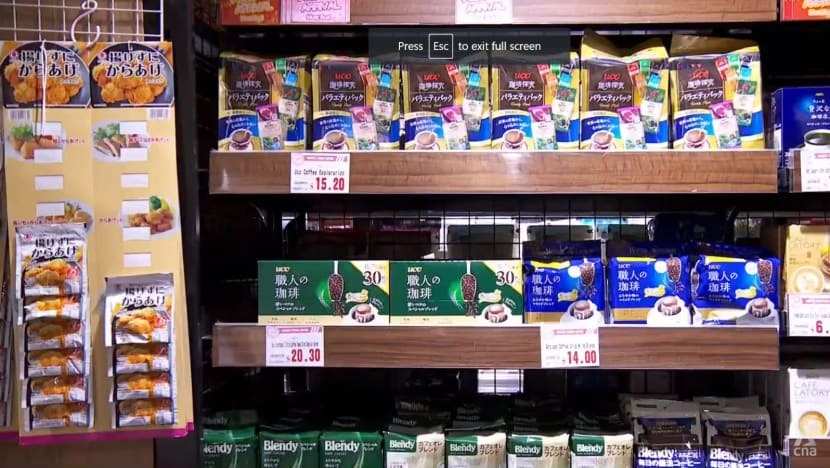Importers see cost of goods fall with stronger Singapore dollar

Image: Collected
Policy moves to arrest higher inflation, such as by appreciating the Singapore dollar, are starting to see effects in the market.
Importers told CNA it is now nearly 15 per cent cheaper for them to buy products from overseas.
However, such savings are still not being passed down to consumers, as rising transport and labour costs still weigh down on their bottom lines, they said.
CHEAPER THAN LOCAL SUPERMARKETS
Thanks to a stronger Singapore dollar, specialty shops such as Japanese supermarket Iroha International now have more purchasing power when buying goods from overseas.
Iroha International, which was started seven years ago, imports all of its products from Japan. With the stronger Singapore currency, it can sell certain products, such as coffee, for at least two dollars less than local supermarkets. Mr Hayato Yaegashi, director of Iroha International, said: "Now, the Singapore dollar is quite expensive. When I started doing business, SGD was 100 yen, but now the SGD has become like 105 yen. So I could buy more items from Japan to Singapore.”
He noted that some bottled beverages have become cheaper, with prices falling about five to 10 per cent.
However, even with falling prices, some shoppers said they are not feeling the benefits of the stronger Singapore currency.
"I mean, to be honest, it’s not really cheaper,” said one shopper in Iroha International. “But here, I think it's the appeal of the quality. I think you still get things that are really authentic."
Another shopper told CNA that products are sometimes cheaper, especially for special products that the store imports directly from Japan, as opposed to another supermarket which gets them from a distributor.
COST PRESSURES REMAIN
The savings are not trickling down to customers, as cost pressures are still a challenge for businesses.
The Meat Club is an online butcher that imports produce from countries such as Australia and New Zealand, and sends the orders directly to their customers.
Even without paying for a middleman or warehousing, it still has not translated into cheaper prices.
Its CEO Brad Ross told CNA: “Labour costs are going up, operating costs are going up, freight costs are going up.”
He said that while the savings do help to “provide a bit of relief”, on the whole, costs are still rising.
“That extra margin is needed to fund marketing, operating expenses and things like that. So that currency difference is not necessarily enough to compete with the rising costs of everything else,” said Mr Ross.
There may be signs of better times ahead for businesses here, with headline and core inflation easing last month, and authorities expecting a moderation in the second half of this year.
Importers told CNA it is now nearly 15 per cent cheaper for them to buy products from overseas.
However, such savings are still not being passed down to consumers, as rising transport and labour costs still weigh down on their bottom lines, they said.
CHEAPER THAN LOCAL SUPERMARKETS
Thanks to a stronger Singapore dollar, specialty shops such as Japanese supermarket Iroha International now have more purchasing power when buying goods from overseas.
Iroha International, which was started seven years ago, imports all of its products from Japan. With the stronger Singapore currency, it can sell certain products, such as coffee, for at least two dollars less than local supermarkets. Mr Hayato Yaegashi, director of Iroha International, said: "Now, the Singapore dollar is quite expensive. When I started doing business, SGD was 100 yen, but now the SGD has become like 105 yen. So I could buy more items from Japan to Singapore.”
He noted that some bottled beverages have become cheaper, with prices falling about five to 10 per cent.
However, even with falling prices, some shoppers said they are not feeling the benefits of the stronger Singapore currency.
"I mean, to be honest, it’s not really cheaper,” said one shopper in Iroha International. “But here, I think it's the appeal of the quality. I think you still get things that are really authentic."
Another shopper told CNA that products are sometimes cheaper, especially for special products that the store imports directly from Japan, as opposed to another supermarket which gets them from a distributor.
COST PRESSURES REMAIN
The savings are not trickling down to customers, as cost pressures are still a challenge for businesses.
The Meat Club is an online butcher that imports produce from countries such as Australia and New Zealand, and sends the orders directly to their customers.
Even without paying for a middleman or warehousing, it still has not translated into cheaper prices.
Its CEO Brad Ross told CNA: “Labour costs are going up, operating costs are going up, freight costs are going up.”
He said that while the savings do help to “provide a bit of relief”, on the whole, costs are still rising.
“That extra margin is needed to fund marketing, operating expenses and things like that. So that currency difference is not necessarily enough to compete with the rising costs of everything else,” said Mr Ross.
There may be signs of better times ahead for businesses here, with headline and core inflation easing last month, and authorities expecting a moderation in the second half of this year.
Source: https://www.channelnewsasia.com